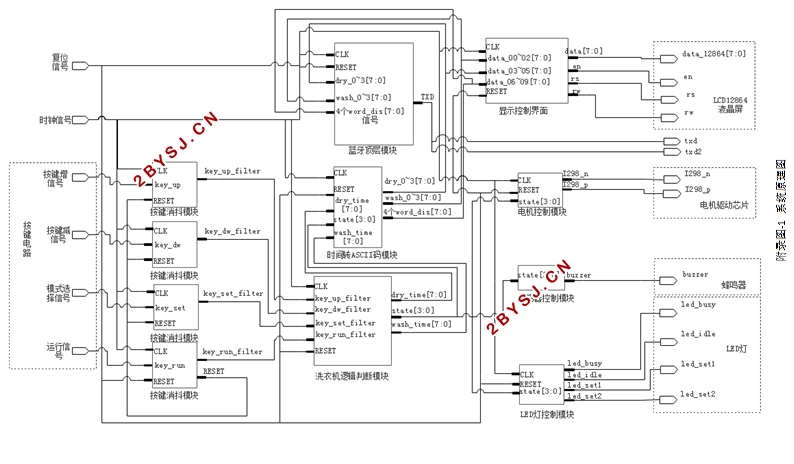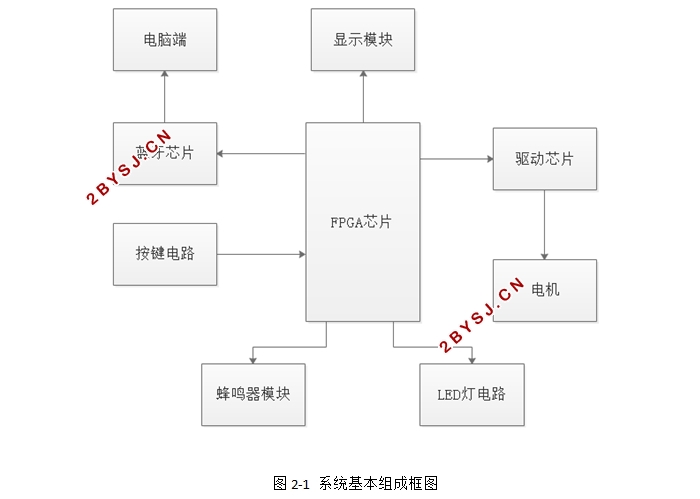基于FPGA的智能洗衣机控制系统设计
无需注册登录,支付后按照提示操作即可获取该资料.
基于FPGA的智能洗衣机控制系统设计(任务书,开题报告,论文17500字)
摘 要
智能洗衣机是在传统洗衣机的基础上进一步改进的家用电器,主要运用了现代的物联网技术和人工智能技术来实现更强大的功能和更人性化的设计,最终达到使人们更方便地处理家务劳动的目的。
本文对智能洗衣机控制系统设计的意义、整体设计原理以及基于FPGA的设计方法进行了介绍。讨论了用什么方法进行该系统的设计以及为什么用这种方法进行设计。通过比较不同的外设元器件和各种开发环境,最终选择了在集成设计环境Vivado上进行编程和仿真,并在以EGO1开发板为控制核心的条件下,主要运用蓝牙、电机驱动、直流电机和LCD12864显示屏实现智能洗衣机系统的运行,以及该系统与电脑端的通信。同时运用了C#语言,在Visual Studio 开发平台上设计显示洗衣机系统实时信息的上位机,并同时在本文中给出了设计方法与调试方法。最后简述了本设计中遇到的问题和错误,并探索出解决的的方法。
关键词:智能洗衣机系统;FPGA ;蓝牙通信;电机驱动
Design of intelligent washing machine control system based on FPGA
Abstract
Intelligent washing machine is a home appliance which is further improved on the basis of traditional washing machine. It mainly uses the modern Internet of things technology and artificial intelligence technology to achieve more powerful functions and more humanized design, and finally achieves the purpose of making people more convenient to deal with housework.
In this paper, the significance of intelligent washing machine control system design, overall design principle and design method based on FPGA are introduced. This paper discusses how to design the system and why to use this method. By comparing different peripheral components and a variety of development environment, ultimately chose on the integrated design environment Vivado programming and simulation, and in the EGO1 development board as the control core, using bluetooth, motor driver, dc motor and LCD12864 display the operation of the intelligent washing machine system, as well as the communication on the system with computer. At the same time, the C# language is used to design the upper computer which displays the real-time information of the washing machine system on the Visual Studio development platform, and the design method and debugging method are given in this paper. Finally, the problems and errors encountered in this design are briefly described, and the solutions are explored.
Key words: intelligent; washing machine system; FPGA; bluetooth communication ; motor drive


目 录
摘要 I
Abstract II
第一章 绪论 1
1.1 课题的背景及其发展 1
1.2 设计的主要内容 2
1.3 论文的结构安排 2
第二章 整体设计 3
2.1 总体设计方案 3
2.2 各主要模块方案选择 3
2.2.1 主控模块的选择 3
2.2.2 蓝牙模块的选择 4
2.2.3显示模块的选择 4
2.2.4 电机驱动模块的选择 4
第三章 智能洗衣机控制系统设计 5
3.1顶层文件及系统工作流程 5
3.2 洗衣机状态判断模块 7
3.3 LCD12864显示模块 9
3.3.1 外设原理 9
3.3.2 模块设计 10
3.4电机控制模块 12
3.4.1 外设原理 12
3.4.2 模块设计 13
3.5按键消抖模块 14
3.5.1 外设原理 14
3.5.2 模块设计 15
3.6状态信息转ASCII码模块 16
3.7蓝牙与UART底层模块 17
3.7.1 外设原理 17
3.7.2 模块设计 18
3.8蓝牙与UART顶层控制模块 20
3.9 蜂鸣器控制模块和LED灯控制模块 22
3.9.1 外设原理 22
3.9.2 蜂鸣器控制模块和LED灯控制模块设计 23
第四章 上位机开发 25
4.1 概述与框图 25
4.2 各主要控件和函数介绍 26
4.2.1 控件与功能 26
4.2.2 函数及算法 26
第五章 系统调试与分析 29
5.1 仿真 29
5.2 调试及其结果 33
5.3上位机的调试与分析 35
5.3.1 临时文本框 35
5.3.2 异常消除 36
结语 37
参考文献 38
附录一 40
